NEWS of the WEEK
Page 70
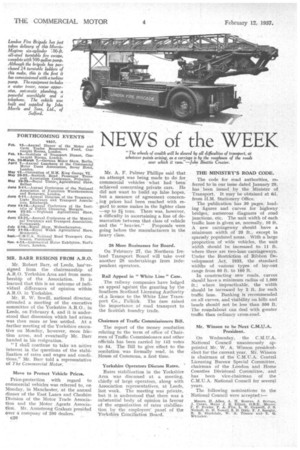
Page 71
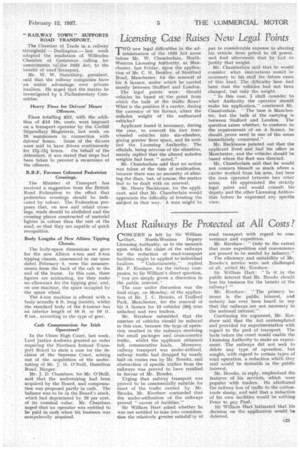
Page 72
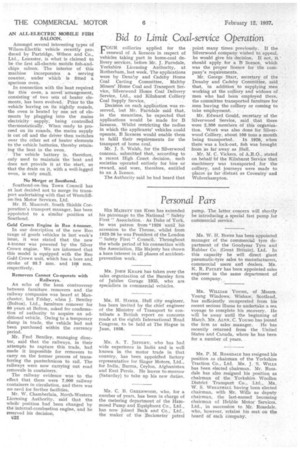
Page 73
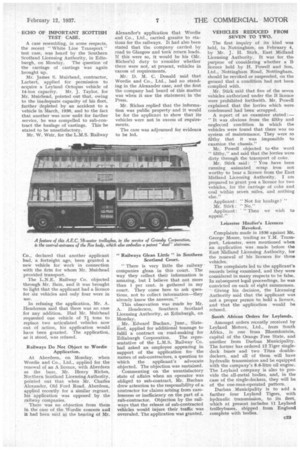
Page 74
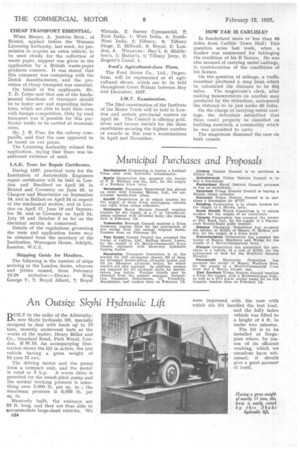
If you've noticed an error in this article please click here to report it so we can fix it.
"The wheels of wealth will be slowed by all difficulties of transport, at whatever points arising, as a carriage is by the roughness of the roads . over which it runs."—John Beattie Crozier.
MR. BARR RESIGNS FROM A.R.O.
Mr. Robert Barr, of Leeds, has"-resigned from the chairmanship of A.R.O. Yorkshire Area and from membership of the Association. It is learned that this is an outcome of individual differences of opinion within A.R.O. in Yorkshire.
Mr. R. W. Sewill, national director, attended a meeting of the executive committee of the 'Yorkshire A.R.O., in Leeds, on February 4, and it is understood that dissension which had arisen was then more or less settled. At a further meeting of the Yorkshire executive on Monday, however, more friction arose, and eventually Mr. Barr handed in his resignation.
"I shall continue to take an active interest in the questions of the stabilization of rates and wages and conditions," Mr. Barr told a representative of The Commercial Motor.
Move to Protect Vehicle Price,.
Price-protection with regard to commercial vehicles was referred to, on Monday, in Manchester, at the annual dinner of the East Lanes and Cheshire Division of the Motor Trade Association and the Motor Agents Association. Mr. Armstrong Graham presided Ozer a company of 200 'dealers.
c20 Mr. A. F. Palmer Phillips said that an attempt was being made to do for commercial vehicles what had been achieved concerning private cars. He did not want to build up false hopes, but a measure of agreement concerning prices had been reached with regard to some makes in the lighter class —up to 2i tons. There was, however, a difficulty in ascertaining a line of demarcation between that class of vehicle and the "heavies," Proposals were going before the manufacturers in the heavy class.
28 More Businesses for Board.
On February 27, the Northern Ireland Transport Board will take over another 28 undertakings from independent operators.
Rail Appeal in " White Line" Case.
The railway companies have lodged an appeal against the granting by the Southern Scotland Licensing Authority of_.a, licence to the White Line Transport Co., Falkirk. The case raised the importance, of road transport to the Scottish foundry trade.
Chairmen of Traffic Commissioners Bill.
The report of the money resolution relating to the term of office of Chairmen of Traffic Commissioners and other officials has been carried by 142 votes to 54. The Bill to give effect to the resolution was formally read, in the House of Commons, a first time.
Yorkshire Operators Discuss Rates.
Rates stabilization in the Yorkshire Area was discussed at a meeting, chiefly of large operators, along with Association representatives, at Leeds, last week. The meeting was private, but it is understood that there was a substantial body of opinion in favour of the organization of rates stabilization by the employers', panel of the Yorkshire Conciliation Board.' THE MINISTRY'S ROAD CODE.
The code for road authorities, referred to in our issue dated January 29, has been issued by the Minister of. Transport. It may be obtained at 6d. from H.M. Stationery Office.
The publication has 30 pages, loading figures and curves for highway bridges, numerous diagrams of road junctions, etc. The unit width of each traffic lane is given as, normally, 10 ft. A new carriageway should have a minimum width of 20 ft., except in sparsely populated areas. With a large proportion of wide vehicles, the unit width should be increased to 11 ft. where there are two-lane carriageways. Under the Restriction of Ribbon Development Act, 1935, the standard widths of various types of lay-out range from 60 ft. to 160 ft. In constructing ifew roads, curves should have a minimum radius of 1,000 ft.: where impracticable, the width should be increased by 2 ft. for each traffic lane. Banking is recommended on all curves, and visibility on hills and bends should not be less than 500 ft. The roundabout can deal with greater traffic than ordinary cross-road.
Mr. Winson to be Next C.M.U.A. President.
On Wednesday, the C.M.U.A. National Council unanimously appointed Mr. W. A. Winson presidentelect for the current year. Mr. Winson is chairman of the' C.M.U.A. Central Licensing Bureau Special Committee, chairman of the London and Home Counties Divisional Committee, and has been vice-chairman of the C.M.U.A. National Council for several years.
The following nominations to the National Council Were accepted:—
Messrs. H. Allen, A. IL Bourne, J. Britten, J. Crews, Major T. B. Elliott, 0.8.E., Messrs. F. F. Fowler. F. A. Flin, L. W. Gupwell, .T. S. Nicholl, G. IT. Nowell, S.. D. Oddy, F. J. Speight, U. B. Stoclidale, W: "A! Timson andE. G. Whitaker.
"RAILWAY TOWN" SUPPORTS ROAD TRANSPORT.
The Chamber of Trade in a railway stronghold — Darlington — last week adopted the resolution of Willesden Chamber of Commerce calling for amendments to the 1933 Act, to the benefit of road transport.
Mr. W. W. Staintherp, president, said that the railway companies have an unfair advantage over private hauliers. He urged that the matter be investigated by a Parliamentary Committee.
Heavy Fines for Drivers' Hours Offences.
Fines totalling 252, with the addition of £10 10s. costs, were imposed on a transport operator by the Cardiff Stipendiary Magistrate, last week, on 26 summonses in connection with drivers' hours. Some of the drivers were said to have driven continuously for 14-15i hours. On behalf of the defendant, it was stated that steps had been taken to prevent a recurrence of the offences.
B.R.F. Favours Coloured Pedestrian Crossings.
The Minister of Transport has received a suggestion from the British Road Federation to the effect that pedestrian crossings should be indicated by colour. The Federation proposes that, on new and relaid crossings, studs should be abolished and the crossing places constructed of material lighter in colour than the rest of the road, so that they are capable of quick recognition.
Body Lengths of New Albion Tipping Chassis.
The body-space dimensions we gave for the new Albion 4-ton and 5-ton tipping chassis, announced in our issue dated February 5, were the measurements from the back of the cab to the end of the frame. In this case, these figures are misleading, for they make no allowance for the tipping gear, and, on one machine, the space occupied by the spare wheel.
The 4-ton machine is offered with a body actually 8 ft. long (inside), whilst the standard body of the 5-tonner has an interior length of 10 ft. or 10 ft. 6 ins., according to the type of gear.
Cash Compensation for Irish Operators?
In the Ulster High Court, last week, Lord Justice Andrews granted an order requiring the Northern Ireland Transport Board to state a case for the decision of the Supreme Court, arising out of the acquisition of the undertaking of Mr. J. H. O'Neill, Hamilton Road, Bangor..
IVIr. J. D. Chambers, for Mr. O'Neill, said that the undertaking had been acquired by the Board, and compensation was proposed partly in cash. The balance was to be in the Board's stock, which had depreciated by 20 per cent. of its nominal value. Mr. Chambers urged that an operator was entitled to be paid in cash when his business was compulsorily acquired.
AN ALL-ELECTRIC MOBILE FISH SALOON.
Amongst several interesting types of Wilson-Electiic vehicle recently produced by Partridge, Wilson and Co., Ltd., Leicester, is what is claimed to be the first all-electric mobile fish-and'chips saloon. The interior of this machine incorporates a serving counter, under which is fitted a spacious oven. In connection with the heat required for this oven, a novel arrangement, consisting of two sets of heater elements, has been evolved. Prior to the .vehicle leaving on its nightly rounds, the oven is heated by one set of elements by plugging into the mains electricity • supply. being controlled thermostatically. When ready to proceed on its rounds, the mains supply is cut off and the driver then switches over the other set of heater elements to the vehicle batteries, thereby retaining the heat in the oven.
• The vehicle battery is, therefore, only used to maintain the heat and does not provide it at the start, so that the drain on it, with a well-lagged Oven, is only small.
No Merger at Southend.
Southend-on-Sea Town Council has at last decided not to merge its transport undertaking with that of Westcliffon-Sea Motor Services, Ltd.
Mr. H. Muscroft, South Shield S Corporation's transport manager, has been appointed to a similar position at Southend.
Gold Crown Engine in Reo 4-tonner.
In our description of the new Reo range of goods vehicles in last. week's issue, it was stated that the new 4-tonner was powered by the Silver Crown engine. We are informed that this model is equipped with the Reo Gold Crown unit, which has a bore and stroke of 85.7 mm. and 10.8 mm. respectively.
Removers Cannot Co-operate with Railways.
An echo of the keen controversy between furniture removers and the railway companies was heard at Manchester, last Friday, when J. Bentley (Bolton), Ltd., furniture remover for 80 years at Bolton, asked for confirmation of authority to acquire an additional vehicle. Owing to a temporary slump in trade, the vehicle had not been purchased within the currency period.
Mr. Fred Bentley, managing direc tor, said that the railways, in their attempts to capture this trade, had made it impossible for removers to carry on the former process of transferring the pantechnicon to rail. The railways were now carrying out road removals in containers.
The railway evidence was to the effect that there were 7,000 railway containers in circulation, and there was no need for further facilities.
Mr. W. Chamberlain, North-Western Licensing Authority, said that the whole position had been changed by the internal-combustion engine, and he reserved his decision.
e2.2 ECHO OF IMPORTANT SCOTTISH TEST CASE.
A case resembling, in some respects, the recent "White Line Transport " test case, was heard by the Southern Scotland Licensing Authority, in Edinburgh, on Monday. The question of the carriage of castings was again brought up.
Mr. James S. Muirhead, contractor, Larbert, applied for permission to acquire a Leyland Octopus vehicle of 14-ton capacity. Mr. J. Taylor, for Mr. Muirhead, pointed out that, owing to the inadequate capacity of his fleet, further depleted by an accident to a vehicle in March, 1936, and to the fact that another was now unfit for further service, he was compelled to sub-contract the haulage of castings. This he stated to be unsatisfactory.
Mr. W. Weir, for the L.M.S. Railway Co., declared that another applicant had, a fortnight ago, been granted a new vehicle for work in connection with the firm for whom Mr. Muirhead provided transport.
The L.N.E. Railway Co. objected through Mr. Bain, and it was brought to light that the applicant had a licence for six vehicles and only four were in use
In refusing the application, Mr. A. Henderson said that there was no case for any addition. Had Mr. Muirhead requested one vehicle of 71 -tons to replace two articulated vehicles now out of action, his application would hav.e been granted. The application, as it stood, was refused.
Railways Do Not Object to Wordie Application.
At Aberdeen, on Monday, when Wordie and Co., Ltd., applied for the renewal of an A licence, with Aberdeen as the base, Mr. Henry Riches, Northern Scotland Licensing Authority, pointed out that when Mr. Charles Alexander, Old Ford Road. Aberdeen, applied recently for a similar regrant, his application was opposed by the railway companies.
There was no objection from them in the case of the Wardle concern and it had been said at the hearing of Mr.
Mexander's application that Wordie and Co., Ltd., carried granite to stations for the railways. It had also been stated that the company carried by road to Glasgow and took return loads. If this were so, it would be his (Mr. Riches's) duty to eonsider whether there were not, at present, vehicles in -excess of requirements.
Mr: D. M. C. Donald said that Wordie and Co., Ltd., had no standing in the Alexander case, and the first the company had heard of this matter was when it saw the statement in the Press.
Mr. Riches replied that the information was public property and it would be for the applicant to show that its vehicles were not in excess of requirements.
The case was adjourned for evidence to be led.
" Railways Glean Little " in Southern Scotland Court.
"There is very little the railway companies glean in this court. The way they collect their information is amazing, but I believe that not more than 1 per cent, is gathered in my court. They come here to ask questions, not to collect information—they already know the answers."
This observation was made by Mr. A. Henderson, Southern Scotland Licensing Authority, at Edinburgh, on Monday. Mr. Edward Buchan, Junr., Slateford, applied for additional tonnage to fulfil a contract on road-making for Edinburgh Corporation. The representative of the L.M.S. Railway Co. had asked an employee appearing in support of the application for the names of sub-contractors, a question to which the applicant's advocate objected. The objection was sustained.
Commenting on the unsatisfactory state of affairs when an operator was obliged to sub-contract, Mr. Buchan drew attention to the responsibility of a contractor for claims arising from carelessness or inefficiency on the part of a sub-contractor. Objection by the railways that the release of sub-contracted vehicles would injure their traffic was overruled. The application was granted. VEHICLES REDUCED FROM SEVEN TO TWO.
The first inquiry of its kind was held, in Nottingham, on February 4, by Mr. J. H. Stirk, East Midland Licensing Authority. It was for the purpose of considering whether a B licence held by H. Powell and Son, Ltd., Nottingham Road, Nottingham, should be revoked or suspended, on the ground that a condition had not been complied with.
Mr. Stirk said that five of the seven vehicles authorized under the B licence were prohibited forthwith. Mr. Powell explained that the lorries which were condemned had been scrapped.
A report of an examiner stated:— " It was obvious from the filthy and neglected condition in which the vehicles were found that there was no system of maintenance. They were so filthy that it was impossible to examine the chassis."
Mr. Powell objected to 'the word " filthy," and said that the lorries were dirty through the transport of coke.
Mr. Stirit said: "You. have been running animated scrap iron not worthy to bear a licence from the East Midland Licensing Authority, I am prepared to grant you a licence for two vehicles, for the carriage of coke and coal .within seveii miles, and nothing else."
Applicant : " Not for haulage? "
Mr. Stirk ",No."
Applicant: 'Then we wish to appeal."
Leicester Haulier's Licences Revoked.
Complaints made in 1936 against Mr. George Moore, trading as T.M. Transport, Leicester, were mentioned when an application was made before the East Midland Licensing Authority, for the renewal of his licences for three vehicles.
The complaints led to the applicant's records being examined, and they were considered in many respects to be false. In subsequent legal proceedings, he was convicted on each of eight summonses.
Giving his decision, the Licensing Authority said that the applicant was not a proper person to hold a licence, and that the application would be refused.
South African Orders for Leylancis.
Amongst orders recently received by Leyland Motors, Ltd., from South Africa, is one from Bloemfontein, capital of the Orange Free State, and another from Durban Municipality. The former has. ordered 12 Tiger singledeck buses and two Titan doubledeckers, and all of them will have hydraulic transmission and be equipped with the company's 8.6-litre oil engine. The Leyland company is also to provide the all-metal bodies, and, in the case of the single-deckers, they will be of the one-man-operated pattern.
Durban Municipality is to add a further four Leyland Tigers, with hydraulic transmission, to its fleet, which at present includes 11 Leyland trolleybuses, shipped from England complete With bodies. CHEAP TRANSPORT ESSENTIAL.
When Messrs. A. Jenkins Bros., of Bristol, applied before the Western Licensing Authority, last week, for permission to acquire an extra vehicle, to be used chiefly for the collection of waste paper, support was given to the application by a British waste-paper products concern. It was stated that this company was competing with the Dutch manufacturers, and the provision of cheap transport was essential.
On behalf of the applicants, Mr. T. D. Cofpe said that one of the fundamental functions of transport should be to foster new and expanding industries, which are able to hold their own with foreign competition. Only by road transport was it possible for this particular traffic to be carried at economic rates.
Mr. J. B. Pine, for the railway companils, said that the case appeared to be based on cut prices.
The Licensing Authority refused the application, saying that there was insufficient evidence of need.
I.A.E. Tests for Repair Certificates.
During 1937, practical tests for the Institution of Automobile Engineers repair certificates will be held in London and Bradford on April 10, in Bristol and Coventry on June 26, in Glasgow and Manchester on September 18, and in Belfast on April 24 in respect of the mechanical section, and in London on April 17, June 19 and September 25, and in Coventry on April 24, July 10 and October 2 so far as the electrical section is concerned.
Details of the regulations governing the tests and application forms may be obtained from the secretary of the Institution, Watergate House, Adelphi, London, W.C.2.
Shipping Guide for Hauliers.
The following is the number of ships arriving at the London docks, wharves and jetties named, from February 12-20 inclusive :—Docics : King George V, 7; Royal Albert, 7; Royal Victoria, 2; Surrey Commercial, 7; East India, 1; West India, 4; SouthWest India, 2; Tilbury, 9; Tilbury Stage, 2; Millwall, 3; Royal, 2; London, 5. WHARVES: Hay's, 6; Middleton's, 1; Butler's, 1; Tilbury Jetty, 2; Regent's Canal, 1.
Ford's Agricultural-show Plans.
The Ford Motor Co., Ltd., Dagenham, will be represented at 41 agricultural shows, which are to be held throughout Great Britain between May and December, 1937.
I.M.T. Examination, The 23rd examination of the Institute of the Motor Trade will be held in London and certain provincial centres on April 30. The Council is offering gold, silver and bronze medals for the three candidates securing the highest number of awards in this year's examinations in April and November. HOW FAR IS CARLISLE?
Is Sunderland more or less than 60 miles from Carlisle Town Hall? This question arose last week, when a haulier was summoned for infringing the condition of his B licence. He was also accused of carrying metal castings, in contravention of the conditions of his licence.
On the question of mileage, a traffic examiner produced a map from which he calculated the distance to he 62f miles. The magistrate's clerk, after making measurements on another map produced by the defendant, annol,inced the distance to be just under 60 miles.
On the charge of carrying metal castings, the defendant submitted that these could properly be classified as building materials, a commodity which he Was permitted to carry.
The magistrate dismissed the case on both counts.




























































































































































